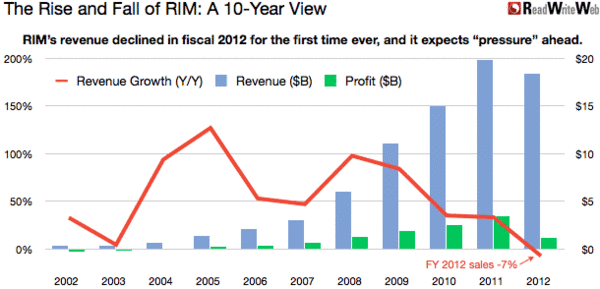
BlackBerry-maker Research In Motion shares are down tonight after reporting a terrible quarter: Sales are shrinking at a time when its main competitor, Apple, saw iPhone sales more than double. RIM is no longer profitable. And now it is looking for a new plan.

It is, truly, the end of RIM as we know it.
The important bits from RIM’s earnings release (PDF) include:
- Sales down 25% year-over-year to $4.2 billion, for the quarter ending on March 3. (For context, Apple’s iPhone revenue grew 133% year-over-year in Q4, and even struggling Motorola’s mobile device sales grew 5%.)
- A net loss of $125 million, versus a profit of $934 million a year ago.
- “The company expects continued pressure on revenue and earnings throughout fiscal 2013.” It will also stop making public predictions of how it’s going to do financially. (So as not to keep missing those numbers, and end up looking worse.)
- RIM’s former co-CEO Jim Balsillie – who was often the face of the company – will leave its board of directors. And its COO and CTO are leaving.
- RIM is “undertaking a comprehensive review of strategic opportunities including partnerships and joint ventures, licensing, and other ways to leverage RIM’s assets and maximize value for our stakeholders.” In other words, figuring out what to do next.
This is a completely different company than the one that helped lead the smartphone revolution over the past decade, and even than the one we knew just a year ago, when it was at least still profitable. (Its rise and fall, captured in the chart above, is worth a look.)
Not only is RIM in worse financial shape, but all bets are off for its recovery.
There is a very real chance that RIM will come out of this as the property of another company, or at least very different than it is today. If it stays independent, it will have to become smaller and more nimble before maybe becoming successful again.
One option for RIM might be a deal to merge with Microsoft and/or Nokia: Its enterprise customer base could be worth something to them. Or RIM could try to partner with one of today’s smartphone leaders, such as Samsung. But the Canadian government may try to block a deal that turns RIM’s ownership over to a foreign company.
But it should finally be clear to everyone – especially new CEO Thorsten Heins – that what RIM has tried to do in recent years just isn’t working. And now it’s time to wind down the old RIM that we knew and do something different. Or it’s all over, for real.
More charts: RIM’s Rise and Decline: A 10-Year View

















